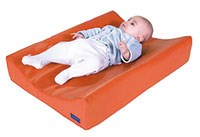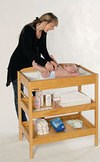Enabling Environments: Collections - Changing times
Nicole Weinstein
Monday, April 16, 2018
Nappy changing is helped by routine, familiarity and a soothing environment. Nicole Weinstein offers some advice and resources

Download the PDF of this article
Nappy changing is an intimate task that requires a consistent, caring and unhurried approach. Wherever possible, the child’s keyperson should perform the task or, in their absence, a ‘buddy’. Providing the right environment, with age-appropriate changing tables and organised storage, is also key.
In settings with an effective keyperson system, a keyperson will change a nappy in the context of a relationship with the child. They will know, for example, how the child likes to be told that a nappy change is needed and any special routines.
CASE STUDIES
Sheringham Nursery School
Julian Grenier, head teacher of Sheringham Nursery School and Children’s Centre in London, says, ‘Intimate care can be stressful. Just ask anyone who has recently been in hospital.
‘Some children like to help by holding the pack with the wipes; some like to sing a song while being changed; some children find it all very stressful and want you to get it over with as quickly as possible.’
At Sheringham, agency staff and students are strictly not permitted to offer intimate care unless they have a long-term placement and they have built up a close and trusting relationship with the child concerned, which is decided by the team leader.
Mr Grenier adds, ‘We want children to know and trust the person. Also, it’s important for safeguarding reasons for children not to get used to the idea that any old person might come along, take them to one side and undress them.’
Children’s Corner Childcare
At Children’s Corner Childcare, a chain of six nurseries in Leeds, intimate care procedures were tightened after the Vanessa George child abuse case in Plymouth.
Operations manager Nicola Stanworth explains, ‘We don’t allow new staff to do any intimate care until they have completed their three-month probation. The same applies to bank staff and supply staff. We are very conscious that children need to build a bond with the adult.’
Room staff take turns to change children’s nappies throughout the day. ‘We used to do it by keyperson – and we have a buddy system – but when they were both away, it became a question of whose responsibility was it?’ says Mrs Stanworth.
‘We never whisk a child away for a nappy change. We always give them a pre-warning and if they are completely engaged in an activity we don’t break them away from it unless they are heavily soiled – we wait until their natural break.
‘The room staff have strong relationships with the children in their care. They usually take the children in pairs. They don’t rush the process – they sing and talk and tell them what’s happening so there’s constant conversation. They know the children that need more support. For example, the younger ones that are settling in can find it upsetting so they talk in a soothing voice and follow the pathway laid out by the parents.’
The nappy-changing station at Children’s Corner nurseries is based in the same room as the children’s toilets. The area is clean, bright and organised, with a wipe-clean vinyl wall stickers. They use the Walk Up Baby Changing Table with Steps from TTS Group, which allows toddlers to climb onto the table themselves, giving them a sense of independence and reducing the risk of back injuries for staff.
 For active babies, the Snoozeland Changing Mat from www.thewholekaboodle.com is useful for its high sides. The NappySafe Smart Disposal System, an odourless nappy bin from the same company, keeps the room smelling fresh.
For active babies, the Snoozeland Changing Mat from www.thewholekaboodle.com is useful for its high sides. The NappySafe Smart Disposal System, an odourless nappy bin from the same company, keeps the room smelling fresh.
Staff use disposable gloves and plastic disposable aprons and wipe down the area with antibacterial spray after each change.
Children are wiped and washed with biodegradable bamboo dry wipes, with water added.
RESOURCES
Changing tables and mats
Community Playthings stocks a changing table with retractable steps, from £1,300, and a Wall-Mounted Shelf with removable dividers for each child’s personal storage, £325, both at www.communityplaythings.co.uk
Walk Up Baby Changing Table with Steps, £449.95; Wooden Mobile Baby Changing Unit, £214.95 – from www.tts-group.co.uk
Childchanger professional grade changing mat £24, and Seaside design changing mat £6.69 at www.smudge-dribble.com
Changing Station and Nappy Sorter, £799.90, from www.earlyyearsresources.co.uk
 The Trudy Nursery Changing Unit, £149.99, sits on top of any storage unit; the Vertical Changing Unit, £299.99, attaches to the wall; the Clara Baby Changer, £129.99, has a gently curved back; and the Maple Changing Station, £459.99, comes with stairs that can be stored under the unit – www.hope-education.co.uk
The Trudy Nursery Changing Unit, £149.99, sits on top of any storage unit; the Vertical Changing Unit, £299.99, attaches to the wall; the Clara Baby Changer, £129.99, has a gently curved back; and the Maple Changing Station, £459.99, comes with stairs that can be stored under the unit – www.hope-education.co.uk
Horizontal and Vertical Baby Changing Units, £219.95 each, feature two hooks to provide ready access to a nappy bag and accessory shelf; plus the Baby Changing Unit, £210.90, and Deluxe Changing Mat, £8.60 – www.ypo.org.uk
Snoozeland Changing Mats start at just £6.95, while the £39.95 version has a concave surface designed for active and larger babies – from www.thewholekaboodle.com
Other resources
For nappy disposal, try the NappySafe Smart Disposal System, £74.95, from www.thewholekaboodle.com; the Tommee Tippee Sangenic Nappy Disposal Unit, £19.99, from www.tts-group.co.uk, or the Nappy Disposal Bin, £140.23, from www.earlyyearsresources.co.uk
Nappy Bags, 6pk of 300 bags, for £9.90, along with Antibacterial Cleanser, £1.95; pack of 6 500ml Antibacterial Hand Wash, £7.95; and pack of 3 Cotton Wool Rolls, £5.95 – all from www.earlyyearsresources.co.uk
CannyMum Bamboo Dry Wipes, 8 packs x 100 wipes, £24.98, from www.amazon.co.uk; disposable flannel dry wipes, £35.32 for 30x100 wipes, www.smudge-dribble.com
INTIMATE CARE: ADVICE
By Nicola Wardropper, early years advisor for the National Day Nurseries Association
Who should change a child’s nappy?
We strongly recommend that the keyperson changes the child’s nappy wherever possible. When this isn’t possible due to shift changes or staff absences, a keyperson buddy or other staff member the child has bonded with or feels comfortable with should take over. Changing nappies within a conveyor-belt system leaves little time to engage with children, so opportunities for promoting children’s social, emotional, language and physical development can be missed.
What are parents’ main concerns?
Parents want practitioners to change their child’s nappy with the same care and attention as they would do at home. Talk to any parent who is concerned about male staff changing nappies on a case-by-case basis. Discuss their concerns and talk them through care policies and procedures to allay their fears.
Where should nappies be changed?
To keep children feeling secure and comforted, we would advise staff change children’s nappies in view of other children and practitioners, whenever possible. Where this is not possible, and it has to be done in another room, we would always advise leaving the door open – to strike a balance between maintaining the child’s privacy and protecting the child from potential harm and staff from any accusations.
What do you advise when a child is new or anxious?
Work in partnership with parents to find out about home routines and introduce the child to the nappy-changing area when they start so they begin to recognise their new environment. Add a favourite toy to the changing area to help the child relax. Encourage parents to dress their child in clothes that will make changing smooth and easy – struggling with lots of buttons when a child is distressed can only distress them more.
What other advice would you give?
All staff should have training in appropriate intimate care routines in line with a setting’s polices and procedures and receive specialist training where necessary – for example, when a child needs specialist medical support.
MORE INFORMATION
All about… care routines’ by Penny Tassoni shows how routines can support early learning, www.nurseryworld.co.uk
www.ndna.org.uk/NDNA/Shop/Policies_and_Procedures_page_1.aspx







